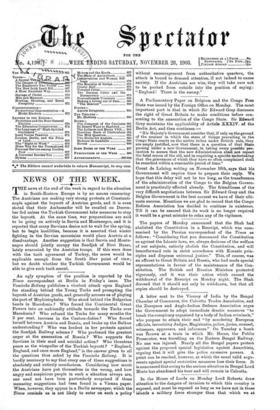An ugly symptom of the position is reported by the
Times correspondent at Berlin in Friday's issue. The Vossische Zcitung publishes a virulent attack upon England for standing behind the Young Turks and prompting the boycott of Austrian goods, and generally accuses us of playing the part of Mephistopheles. Who stood behind the Bulgarian bands in Macedonia Who forced the Continental Great Powers into an unfriendly attitude towards the Turks over Macedonia? Who refused the Turks for many months the 3 per cent. increase in the Custom-duties ? Who forced herself between Austria and Russia, and broke up the Balkan understanding ? Who was loudest in her protests against the Sandjak Railway scheme ? Who professed the greatest anger at the annexation of Bosnia ? Who supports the Servians in their mad and suicidal action ? Who threatens peace as the wirepuller of the Turkish boycott ? "England, England, and once more England," is the answer given to all the questions thus asked by the Vossische Zsitung. It is hardly necessary to say that every one of these suggestions is absolutely and entirely mendacious. Considering how much the Austrians have put themselves in the wrong, and how angry and suspicious people in such a situation always are, one need not have been particularly surprised if these menacing suggestions had been found in a Vienna paper. When, however, they appear in a Berlin newspaper, which the Times reminds us is not likely to enter on such a policy without encouragement from authoritative quarters, the attack is bound to demand attention, if not indeed to cause anxiety. If the Austrians are wise, they will take care not to be pushed from outside into the position of saying : "England! There is the enemy."


















































